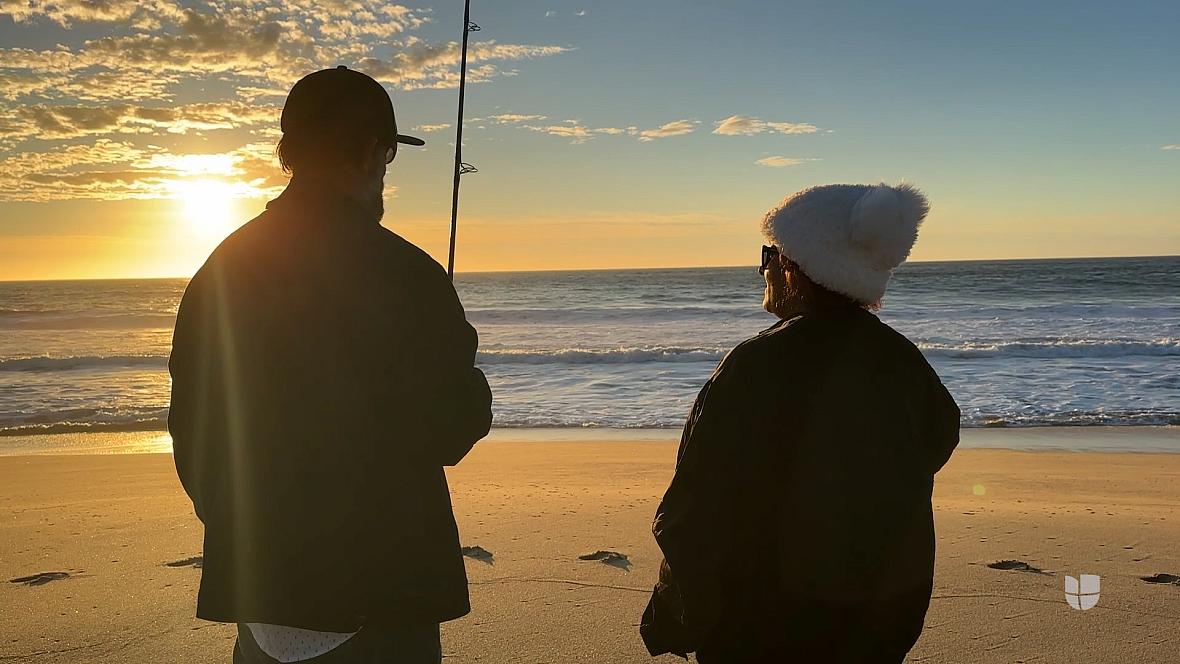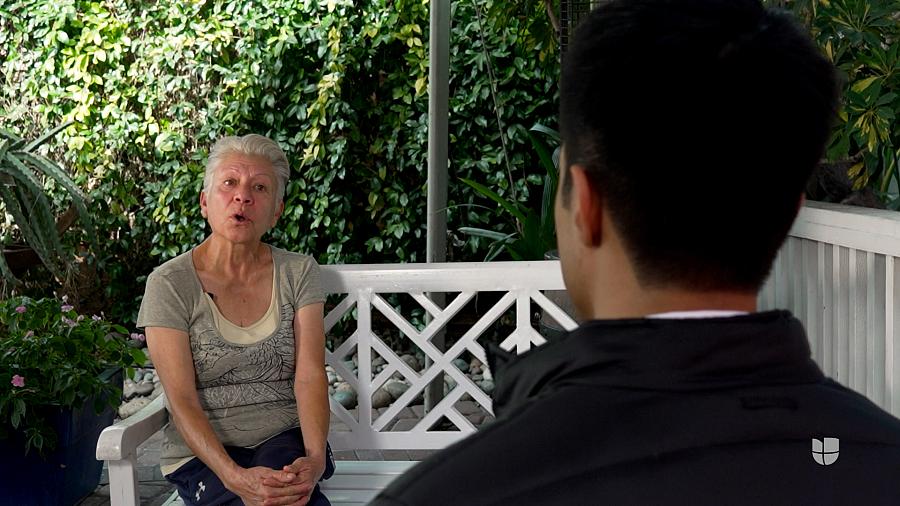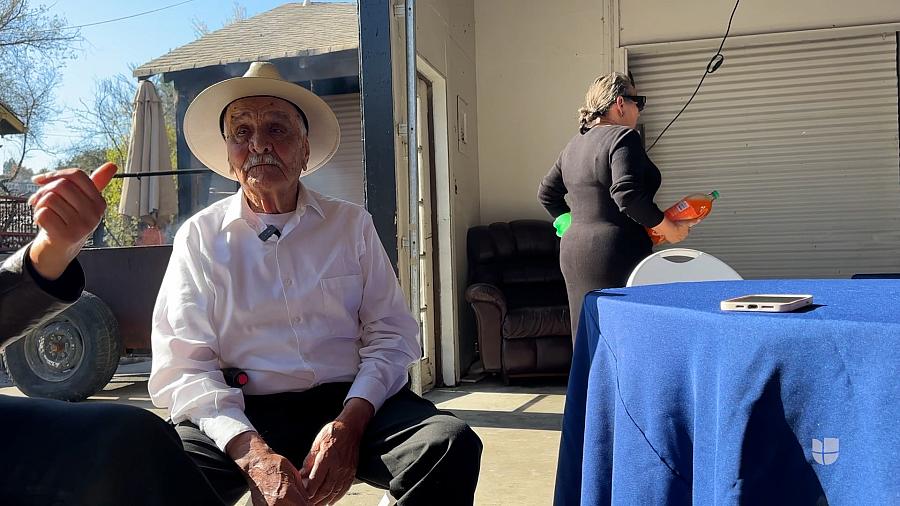Latinos Without Family Face Loneliness As They Age
The story was co-published with Univision 14 Bay Area as part of the 2024 Ethnic Media Collaborative, Healing California.

"Loneliness is an emptiness that is filled with a gesture, a word, or simply the company of
someone willing to be there." - Silvia, who has family in Mexico, has been alone in this country for more than 30 years.
Univision 14 Bay Area
Saddam:
Growing old in the United States as an immigrant— is it hard? Is it easy?

Silvia says that growing old is hard as an immigrant.
Silvia:
It’s hard, it’s hard, first of all, as an immigrant. If you don’t seek help, if you get too sick and
can’t move, if you depend on someone else and you’re alone.
Migrating means leaving everything behind with the hope of a better future, but often, in
that journey, more than just material things are lost: the close embrace, the voice asking
how you’re doing, the human warmth.
NAT – Rooster crowing
Don Luis:
"I can do it."
Don Luis, 100 years old, gets up every morning to walk and check on his plants. Today is
family Sunday, and he’s waiting to welcome his 12 children, 33 grandchildren, and 18
great-grandchildren.
Don Luis:

Don Luis, 100 years old, gets up every morning to walk and check on his plants. Today is
family Sunday, and he’s waiting to welcome his 12 children, 33 grandchildren, and 18
great-grandchildren.
Univision 14 Bay Area
Do you want to see my whole family?
This is my whole family.
Saddam
What does it feel like to have such a big family?
I’ve always felt very supported by my family… who knows how you all feel.
NAT – Family greeting him
Lucy Rangel – Younger sister:
"It’s really beautiful. It feels like if I can’t come for some reason, I feel like I missed
something very valuable that I’ll never get back. There has to be a really big reason not to
come. For me, it’s very beautiful to see my mom and dad, to come on Sundays, and
obviously see my family that comes. It’s really beautiful, very nice to spend time with
them."
NAT – Family socializing, cooking BBQ, playing cards
Don Luis:
What does it feel like to have such a big family?
Well, it feels like God is with us, keeping this big family together.
Yes, it’s a blessing, right?
Well, I think so.
Have you been happy today?
Of course!
But when migrating, many times a family is forced to leave everything behind, hoping for a
better future.
María de Jesús Rangel González:
"It hurt so much to leave behind 11 brothers and sisters and my parents in my hometown,
coming here in search of the American dream."
Saddam:
The Rangel family is from a town in Jalisco, Mexico. Chuy, as her family calls her, decided
to leave everything behind for the American dream. Now she has her whole family with her
in the U.S., but she first lived accompanied by loneliness.
María de Jesús Rangel González:
"Very lonely, extremely lonely. Every morning I would cry, and my thoughts were with my
family back home. Depending on the time of day, I’d say, ‘Right now, they’re making
tortillas, they’ve gone to milk the cows, now they’re coming back, and right now, I imagine
they’re playing volleyball,’ because that was the only sport we really played."
NAT – Saddam talking on the phone.
"Hi, Mom."
"How is it for you that I’m so far away?"
Alicia Vega:
"It was easier for you because you were looking for something better, but you left me so
sad. It’s not easy, but you get used to it, always hoping you’ll come back and see us."
"What do you miss most about having me there?"
"Seeing you, even if you make me angry and give me problems, but just seeing you."
BRIDGE
I’ve also felt loneliness. It’s a constant companion when migrating to another country. But
over time, a broader reality begins to unfold. Who takes care of the elderly who are alone
and need support or company?
Silvia:
"I started feeling loneliness the moment I arrived in this country. It’s very sad when you
start eating and you don’t know if your children are eating, if they’re okay, if they’re not. The
distance, leaving family behind. Well, whether good or bad, having family— even if we’re
poor— but being together, that makes a huge difference. I worked with loneliness for many
years; it was something very difficult to handle. But over time, I also understood that I had
to detach from it and learn to live alone."
Saddam:
Silvia has been alone in this country for more than 30 years. She has family in Mexico but
doesn’t go back because of her responsibility to send whatever money she can. In her
loneliness, she found a way to accompany herself and others. She doesn’t have a
permanent place to live, so she makes arrangements with families; they give her a space to
sleep, and she helps care for elderly people in their homes who need attention.
Silvia:
"Right now, I’m homeless, living in different houses. They give me a roof over my head, a
little bed to sleep in, but I rest."
Saddam:
In the United States, by 2040, it’s projected that one in four residents will be over 60 years
old, surpassing the adolescent population for the first time. Additionally, the Hispanic
elderly population will be the fastest-growing group: from 15% in 2000, it is expected to rise
to 28% of all older adults by 2040.
Susan DeMarois – Director, California Department of Aging:
"In fact, it’s equal to 15 cigarettes a day."
The executive director of California's Department of Aging points out that lack of social
contact is equivalent to smoking 15 cigarettes a day.
Saddam:
Have you thought about the situation where, as you grow older, you’ll need care, and who
might provide that care?
Silvia:
Yes, I’ve thought about it, I’ve thought about it many times. I’ve even thought, when I get
really sick, I’ll go back to my country to be with my family. But what stops me is the thought
of being a burden. Does that make sense? I mean, if I’ve never been with them— I’ve been
in this country for 30 years— if I go back really sick and needing them to care for me, I’m
going to feel like, ‘Wait a minute…'
Saddam:
But isn’t it difficult? It’s also a bit about the people who care for others, and like you told
me on the phone, that it’s hard to ask for help, or that asking for help is tough. You’re kind
of the proof of this; in a way, it’s like it bothers you, and you feel guilty about being a burden
and asking for help.
Silvia:
Even if it’s family, even if you’ve supported them, even if you’ve given them things, I still
feel like I’d be a burden when I’ve been away from them for so long.
Interestingly, it’s a common response: the barrier to letting someone else take care of us.
Lucy Rangel – Younger sister:
"First of all, because I don’t know how my son will be. I’m raising him the best way I can,
the way my parents raised me."
Saddam:
But the question is, would you let your children take care of you?
Lucy Rangel:
"I don’t think so. But I don’t know. I think my son would have to show me that he’s earned
my trust… to let him take care of me."
Obdulia Rangel – Older sister:
"I don’t have daughters, I only have 4 sons, and honestly, I think they would all want to
help, but each of them will have a wife who might not want to care for us."
Whether we come from a close-knit family or live in solitude, why is it so hard to ask for
help, especially when it comes to taking care of us as older adults?
Gabriela Romero – Psychotherapist:
"And paradoxically, we like to help. So, here, it’s about working on empathy and lowering
those barriers. The ability to be vulnerable and also give others the pleasure of helping. We
feel pleasure in helping others, but we also limit those who want to help us."
Psychotherapist Gabriela Romero explains that there’s a difference between loneliness
and social isolation. Loneliness is a mood that anyone can feel at any time. But during the
pandemic, we all experienced what social isolation really means.
Gabriela Romero – Psychotherapist:
"It’s what really makes us feel accompanied and happy— that quality of life, that quality of
social relationships we have."
NAT – Silvia greeting people – entering an ice cream shop
Silvia:
"If someone doesn’t greet me, it’s because they don’t know me or because they don’t live
in the neighborhood. It’s nice to walk out and have everyone greet you. I can’t imagine
being in a neighborhood where no one knows me or greets me."
Saddam:
"In a way, it’s a way of feeling accompanied. That your family is the neighborhood."
Silvia:
"Yes, definitely. Just the fact that people greet you, that they know you, yes, it makes you
feel accompanied."
NAT – Silvia walking
The California Department of Aging offers programs and services for older adults, the most
important being those that allow them to socialize, interact with others, and feel
accompanied.
There are local agencies designed to improve their quality of life and provide the care they
need, which can be found on the website Aging.ca.gov. Many of these agencies also offer
free transportation services to help seniors get around.
There’s also a "Friendship Line," [(888) 670-1360], available 24 hours a day in Spanish,
where seniors over 60 can speak to someone when they feel lonely.
However, nothing compares to the impact that family can have.

Silvia:
"What I’ve felt from the people I’ve cared for is love. Feeling the love from their children,
knowing that they’re really taking care of their parents. Because just having someone take
care of your mom or dad doesn’t mean they’re going to receive love. The feeling of those
sick people is a feeling of love, of lacking love. They can be cared for, but care without love
is not the same."
Loneliness is an emptiness that is filled with a gesture, a word, or simply the company of
someone willing to be there. Talking to those loved ones—children, siblings, parents—who
are far away, where just one phone call could make the difference in feeling accompanied.
Silvia:
"I’ve come to understand that I will become an older person. I want to grow old, I want to
grow old in a family that lives a long time. But I want to see that someone takes care of me,
just like I take care of those who need help. I want to think that at some point in my life,
someone will offer me a plate of food, will ask me how I am, what I need, what I want."
Sometimes, in the silence of life, we forget that true strength lies in shared vulnerability.
Taking care of our elderly, talking to them, is an act of love that transcends time. But it’s
also important to remember that if the weight of loneliness or fear overwhelms us, asking
for help is not an act of weakness, but of humanity. In the ebb and flow of giving and
receiving, we discover that no one is truly alone if we simply allow others to see us and
reach out to us.
This project was supported by the USC Annenberg Center for Health Journalism, and is part of "Healing California", a yearlong reporting Ethnic Media Collaborative venture with print, online and broadcast outlets across California
